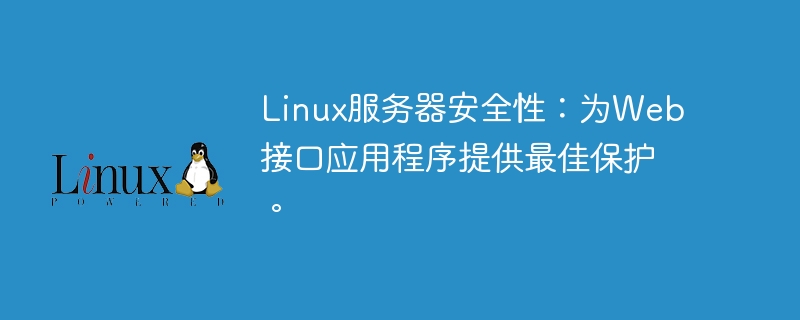

Linux Server Security: Provide the Best Protection for Web Interface Applications
In today's Internet era, Web interface applications have become the first choice for many businesses and individuals development method. However, as the number of web applications increases, so do the security risks associated with them. In order to protect web interface applications from malicious attacks, server security is particularly important. Fortunately, the Linux operating system is known for its powerful security features, making it ideal for building a secure web server. This article will cover some of the ways to provide the best protection by using a Linux server, along with some code examples to help you understand better.
# 更新操作系统 sudo apt update sudo apt upgrade -y # 更新Apache软件 sudo apt install apache2
# 清除所有规则 sudo iptables -F # 允许传入HTTP和HTTPS流量 sudo iptables -A INPUT -p tcp --dport 80 -j ACCEPT sudo iptables -A INPUT -p tcp --dport 443 -j ACCEPT # 拒绝所有其他流量 sudo iptables -A INPUT -j REJECT
# 安装SSL证书 sudo apt install letsencrypt # 为域名生成SSL证书 sudo letsencrypt certonly --email your-email@example.com -d example.com # 配置Web服务器以使用SSL证书
# 创建用户 sudo adduser newuser # 授予用户管理员权限 sudo usermod -aG sudo newuser # 配置SSH公钥认证
# 查看系统日志 sudo tail -n 100 /var/log/syslog # 查看Apache访问日志 sudo tail -n 100 /var/log/apache2/access.log
By following these methods and measures, you can provide the best protection and ensure your Linux servers and web interface applications are safe from malicious attacks. Remember to check and update your system regularly, and keep close monitoring and logging of your server.
Hopefully the code examples and suggestions provided above can help you improve the security of your Linux server and provide the best protection for your web interface applications. I wish your server is stable and safe!
The above is the detailed content of Linux Server Security: Provides optimal protection for web interface applications.. For more information, please follow other related articles on the PHP Chinese website!
 What are the video server configuration parameters?
What are the video server configuration parameters? The difference between WeChat service account and official account
The difference between WeChat service account and official account tencent qqmail plugin
tencent qqmail plugin What card is TF card?
What card is TF card? There is no WLAN option in win11
There is no WLAN option in win11 What are the requirements for opening a digital currency account? Is it free?
What are the requirements for opening a digital currency account? Is it free? How to buy and sell Bitcoin legally
How to buy and sell Bitcoin legally How to use htmllabel label
How to use htmllabel label



